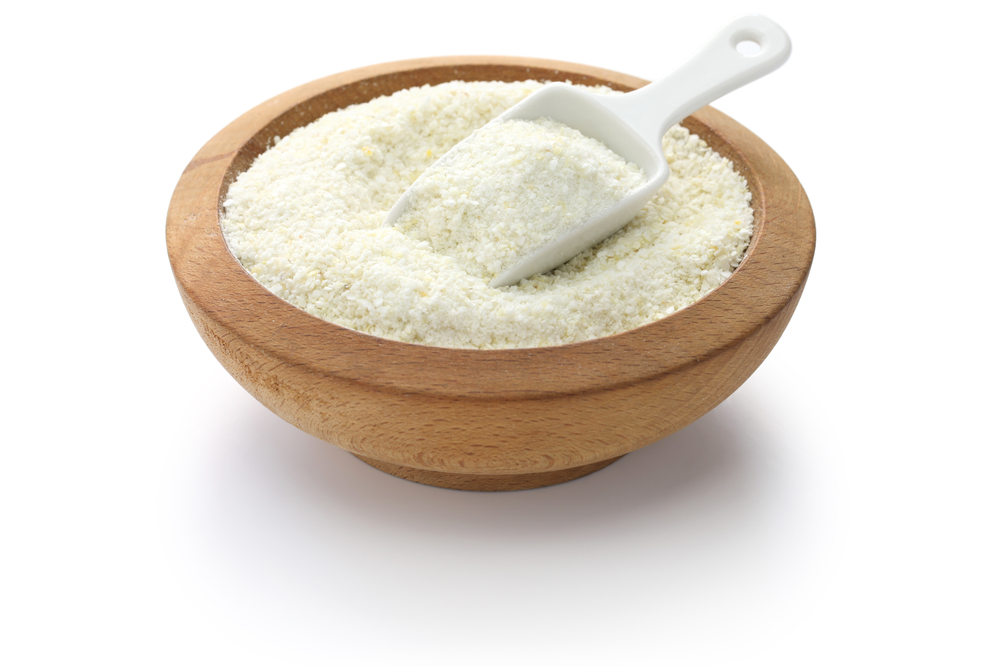As someone who loves to bake, I know how frustrating it can be to find out that you don’t have an essential ingredient on hand.
Oat flour, in particular, is a popular ingredient in many recipes, but it’s not always easy to find. Luckily, there are many substitutes for oat flour that you can use in a pinch.
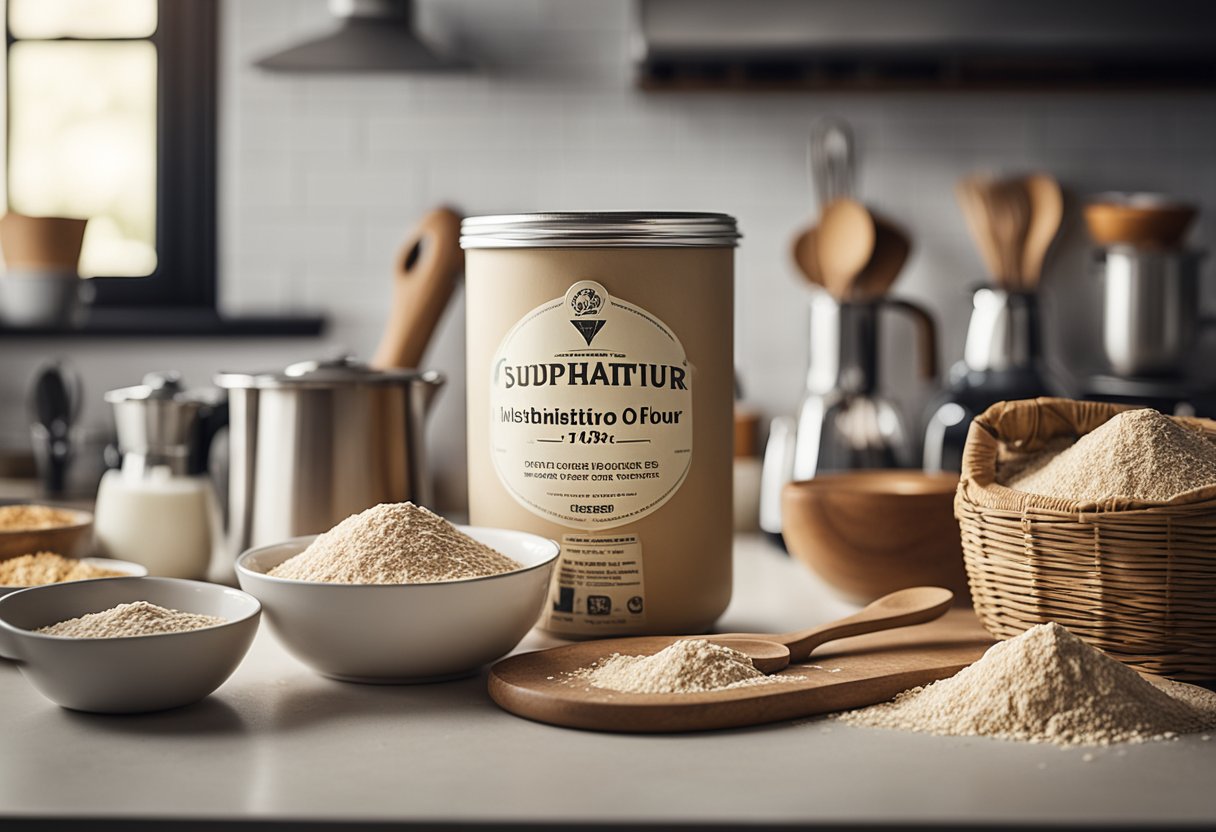
Understanding oat flour is key to finding the best substitute. Oat flour is made from ground oats and is often used in gluten-free baking. It has a slightly sweet, nutty flavor and can be used in a variety of recipes, including bread, cakes, and cookies.
However, oat flour can be difficult to find in some grocery stores, and it’s not always the best option for those with dietary restrictions or allergies.
If you’re looking for a substitute for oat flour, there are many options available. From rice flour to almond flour to cornmeal, there are a variety of substitutes that can be used in place of oat flour.
Making your own oat flour substitute is also an option, and can be a great way to customize the flavor and texture of your baked goods.
Key Takeaways
- Oat flour is a popular ingredient in gluten-free baking, but it can be difficult to find and may not be suitable for those with dietary restrictions or allergies.
- There are many substitutes for oat flour, including rice flour, almond flour, and cornmeal.
- Making your own oat flour substitute is also an option and can be a great way to customize the flavor and texture of your baked goods.
Understanding Oat Flour
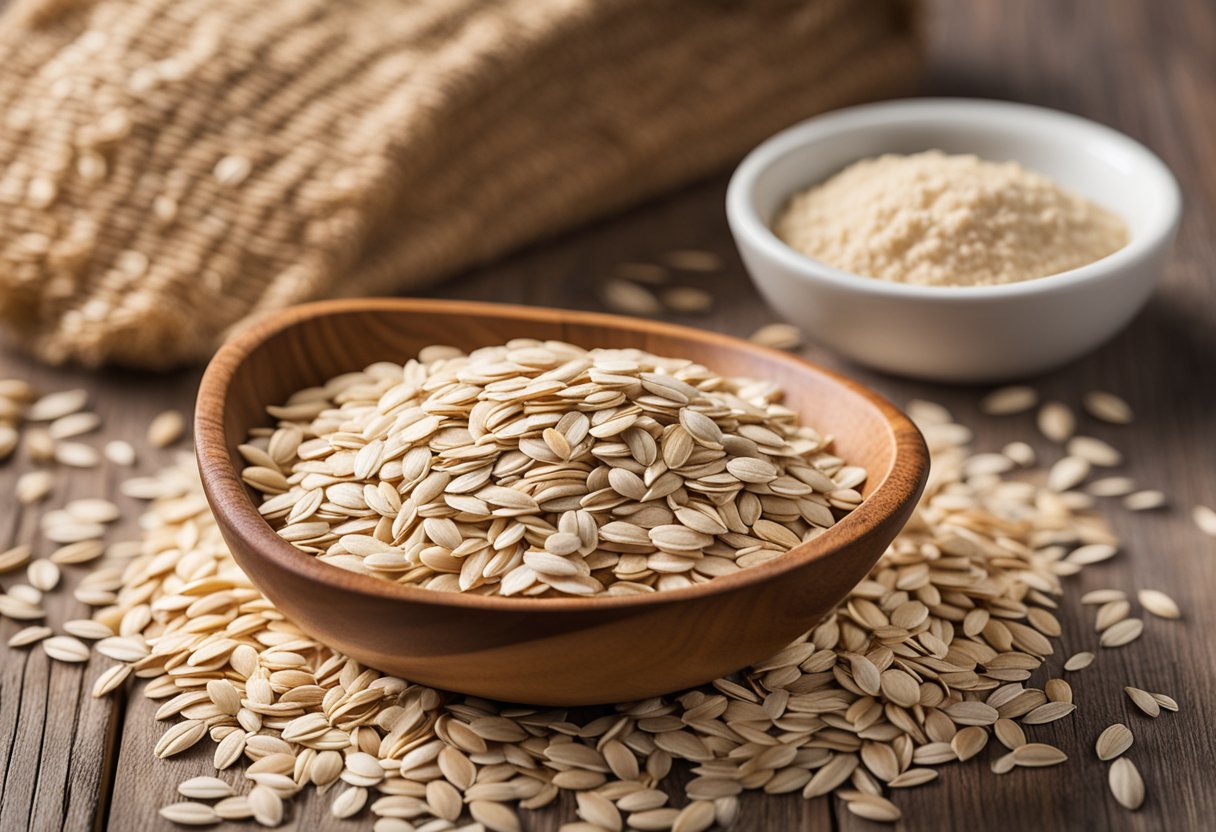
As someone who loves to bake, I’ve experimented with many different types of flours. One flour that has caught my attention recently is oat flour.
Oat flour is a gluten-free flour that is made from ground oats. It has a slightly nutty flavor and a texture that is similar to wheat flour.
One of the main benefits of oat flour is that it is gluten-free. Gluten is a protein found in wheat, barley, and rye that can cause digestive problems for some people. Oat flour is a great alternative for those who are sensitive to gluten or have celiac disease.
In addition to being gluten-free, oat flour is also a great source of nutrition. Oats are high in fiber and protein, which can help keep you feeling full and satisfied. They are also a good source of vitamins and minerals, including iron, zinc, and magnesium.
One of the most notable health benefits of oat flour is its high content of beta-glucans. Beta-glucans are a type of soluble fiber that have been shown to lower cholesterol levels and improve heart health. They may also help regulate blood sugar levels and improve insulin sensitivity.
Overall, oat flour is a great option for anyone looking to add more whole grains to their diet or for those who are gluten-free.
It is a versatile flour that can be used in a variety of recipes, from pancakes to bread to cookies. Plus, it has a host of health benefits that make it a smart choice for anyone looking to improve their nutrition.
Why Substitute Oat Flour
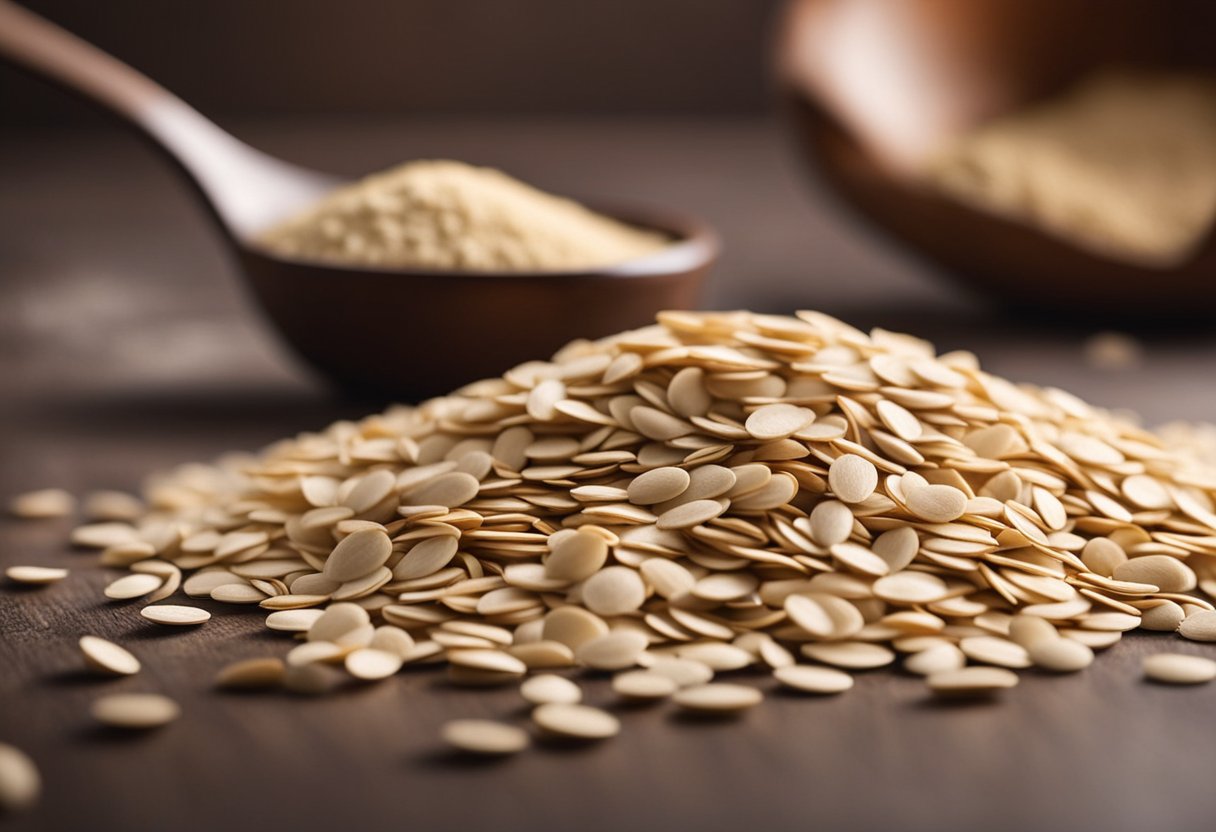
As a baker, I am always looking for ways to experiment with new ingredients and create healthier versions of my favorite baked goods. One ingredient that I have found to be a great substitute for all-purpose flour is oat flour.
There are several reasons why one might want to substitute oat flour for all-purpose flour. For those with celiac disease or gluten sensitivity, oat flour is a great alternative as it is naturally gluten-free.
It is also a good option for those who are looking for a healthier option as it is higher in protein and fiber than all-purpose flour.
Using oat flour in recipes can also add a nutritional boost to your baked goods. Oat flour is a good source of vitamins and minerals such as iron, magnesium, and zinc. It is also a good source of antioxidants which can help reduce inflammation in the body.
When substituting oat flour for all-purpose flour in recipes, it is important to keep in mind that oat flour is more dense than all-purpose flour. This means that it will weigh down baked goods and give them a more dense and chewy texture.
However, with the right recipe and adjustments, oat flour can be used in a variety of baked goods such as cookies, bread, pancakes, muffins, scones, and quick breads.
Overall, substituting oat flour for all-purpose flour can be a great way to add nutritional value to your baked goods and create healthier versions of your favorite recipes.
Types of Oat Flour Substitutes
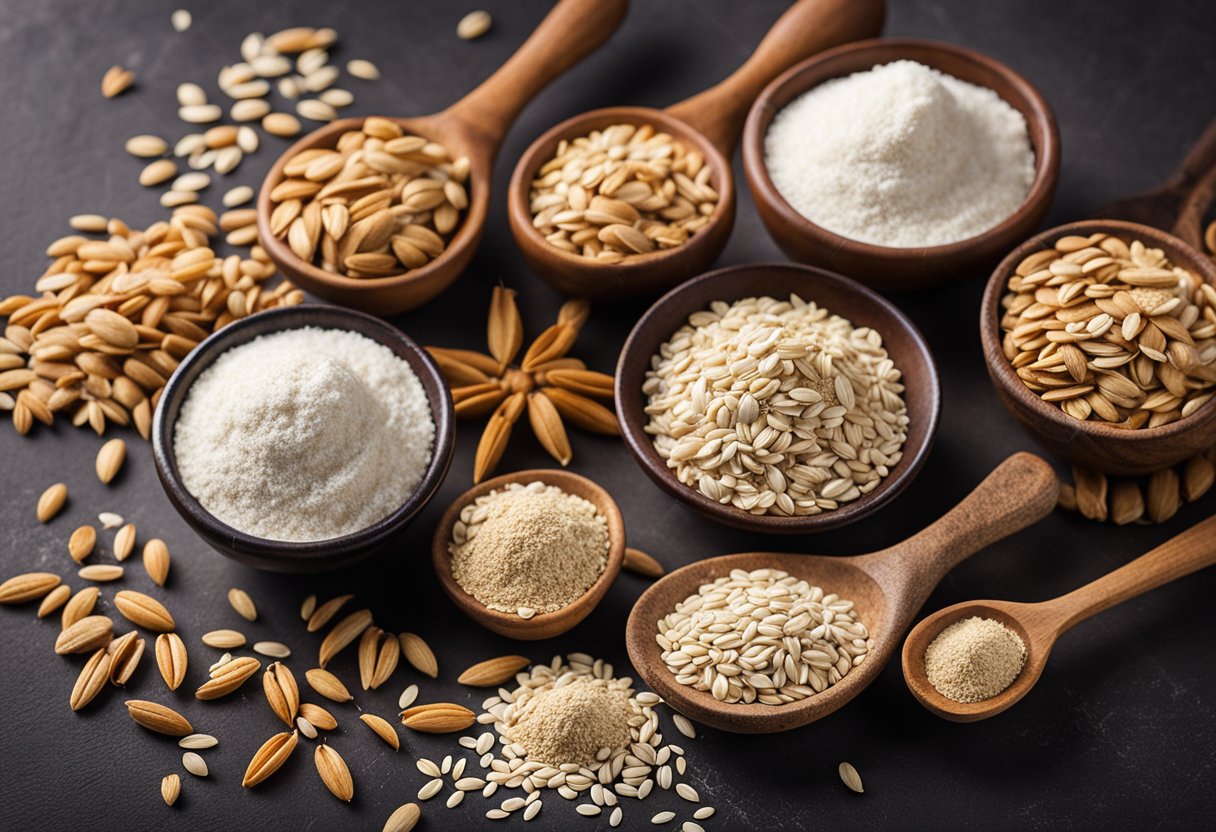
As someone who loves baking, I understand the importance of having the right ingredients. However, sometimes we may not have all the ingredients we need on hand. If you find yourself without oat flour, don’t worry! There are plenty of substitutes you can use that will yield similar results.
Here are some of the best oat flour substitutes:
Almond Flour
Almond flour is a great gluten-free substitute for oat flour. It has a slightly nutty flavor and a similar texture to oat flour.
When using almond flour, keep in mind that it is more absorbent than oat flour, so you may need to adjust the liquid in your recipe.
Wheat Flour
If you don’t have oat flour on hand, wheat flour can be a suitable substitute. However, keep in mind that wheat flour is not gluten-free, so it may not be suitable for those with gluten sensitivities.
Additionally, wheat flour has a different texture and flavor than oat flour, so the end result may not be exactly the same.
Buckwheat Flour
Buckwheat flour is a great substitute for oat flour because it has a similar texture and a slightly nutty flavor. It is also gluten-free, making it a good option for those with gluten sensitivities.
Keep in mind that buckwheat flour may have a strong flavor, so it may not be the best choice for all recipes.
All-Purpose Flour
All-purpose flour is a versatile flour that can be used in a variety of recipes. However, it is not gluten-free, so it may not be suitable for those with gluten sensitivities.
Additionally, all-purpose flour has a different texture and flavor than oat flour, so the end result may not be exactly the same.
Rice Flour
Rice flour is a gluten-free flour that can be used as a substitute for oat flour. It has a slightly sweet flavor and a similar texture to oat flour.
However, keep in mind that rice flour can be more absorbent than oat flour, so you may need to adjust the liquid in your recipe.
Brown Rice Flour
Brown rice flour is another gluten-free substitute for oat flour. It has a slightly nutty flavor and a similar texture to oat flour. Brown rice flour is also higher in fiber than white rice flour, making it a healthier option.
Coconut Flour
Coconut flour is a gluten-free flour that can be used as a substitute for oat flour. It has a slightly sweet flavor and a different texture than oat flour, so the end result may not be exactly the same.
Keep in mind that coconut flour is more absorbent than oat flour, so you may need to adjust the liquid in your recipe.
Barley Flour
Barley flour is a great substitute for oat flour because it has a similar texture and flavor. However, it is not gluten-free, so it may not be suitable for those with gluten sensitivities.
Quinoa Flour
Quinoa flour is a gluten-free flour that can be used as a substitute for oat flour. It has a slightly nutty flavor and a similar texture to oat flour. Quinoa flour is also higher in protein than oat flour, making it a healthier option.
Rye Flour
Rye flour is a great substitute for oat flour because it has a similar texture and a slightly nutty flavor. However, keep in mind that rye flour is not gluten-free, so it may not be suitable for those with gluten sensitivities.
Whole Wheat Flour
Whole wheat flour is a healthier substitute for oat flour because it is higher in fiber and protein. However, it has a different texture and flavor than oat flour, so the end result may not be exactly the same.
Amaranth Flour
Amaranth flour is a gluten-free flour that can be used as a substitute for oat flour. It has a slightly nutty flavor and a similar texture to oat flour. Amaranth flour is also higher in protein than oat flour, making it a healthier option.
Sorghum Flour
Sorghum flour is a gluten-free flour that can be used as a substitute for oat flour. It has a slightly sweet flavor and a similar texture to oat flour. Sorghum flour is also higher in fiber than oat flour, making it a healthier option.
Millet Flour
Millet flour is a gluten-free flour that can be used as a substitute for oat flour. It has a slightly sweet flavor and a similar texture to oat flour. Millet flour is also higher in protein than oat flour, making it a healthier option.
Soy Flour
Soy flour is a great substitute for oat flour because it has a similar texture and a slightly nutty flavor. However, keep in mind that soy flour is not suitable for those with soy allergies.
Chickpea Flour
Chickpea flour is a gluten-free flour that can be used as a substitute for oat flour.
Making Your Own Substitutes
If you don’t have oat flour on hand or prefer to make your own at home, it’s easy to do so with a few simple steps. All you need is a food processor or blender and some rolled oats or steel-cut oats.
To make homemade oat flour, simply add the oats to your food processor or blender and grind until they reach a fine, powdery consistency.
If you’re using rolled oats, it should only take a few pulses to achieve the desired texture. However, steel-cut oats may take a bit longer to grind down.
If you don’t have any oats on hand, you can also make oat flour substitutes using other ingredients. Ground almonds, for example, can be used in place of oat flour in many recipes.
Simply grind the almonds in a food processor or blender until they reach a fine, powdery consistency.
While quick-cooking oats can also be used as a substitute for oat flour, keep in mind that they are more processed and may not yield the same results as homemade oat flour.
Additionally, quick-cooking oats may not work as well in recipes that require a finer texture.
Overall, making your own oat flour substitutes is a great way to save money and ensure that you always have the ingredients you need on hand. With just a few simple steps, you can create a versatile ingredient that can be used in a variety of recipes.
Nutritional Comparison
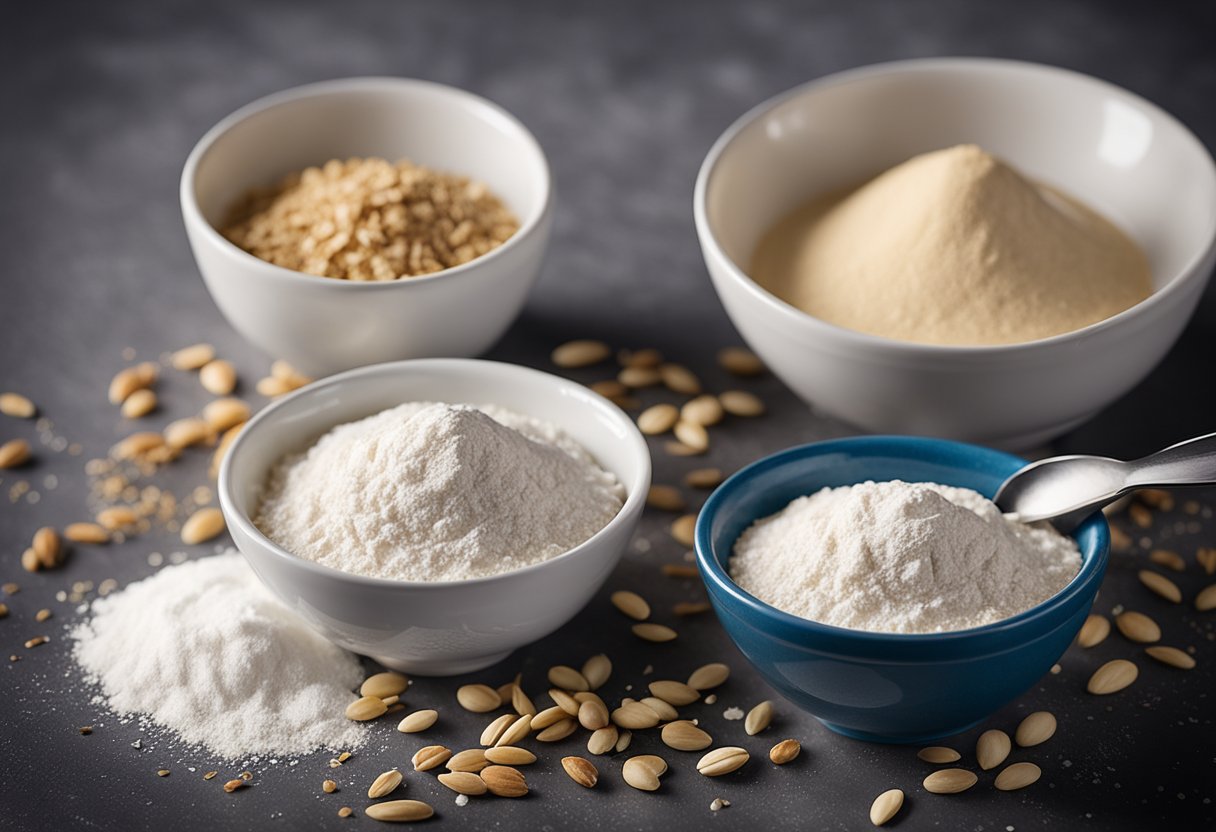
When considering substituting oat flour in recipes, it is important to understand the nutritional differences between oat flour and its substitutes.
Here is a comparison of the nutritional values of oat flour and some of its common substitutes:
| Nutrient (per 100g) | Oat Flour | Brown Rice Flour | Almond Flour | Amaranth Flour |
|---|---|---|---|---|
| Calories | 389 | 366 | 610 | 371 |
| Protein | 16.9g | 7.5g | 21.4g | 14.6g |
| Fat | 6.9g | 2.7g | 54.0g | 7.0g |
| Carbohydrates | 66.3g | 77.2g | 10.6g | 65.3g |
| Fiber | 10.6g | 2.8g | 10.0g | 6.7g |
| Iron | 4.7mg | 0.7mg | 3.7mg | 7.6mg |
| Magnesium | 177mg | 143mg | 268mg | 248mg |
| Calcium | 54mg | 10mg | 264mg | 159mg |
As seen in the table above, oat flour is lower in calories and fat than almond flour, but higher in protein and fiber.
Brown rice flour has a similar calorie count to oat flour, but is lower in protein and fiber. Amaranth flour is higher in iron and magnesium than oat flour, but lower in protein and fiber.
It is important to note that while these substitutes may have different nutritional values, they can still be healthy choices when used in moderation as part of a balanced diet. Additionally, using a variety of flours can help diversify the nutrients in your diet.
Overall, when substituting oat flour in recipes, it is important to consider the nutritional benefits of the substitute and how it fits into your dietary needs.
Using Substitutes in Recipes
When substituting oat flour with other flours, it is essential to consider the recipe’s requirements. Some flours work well for baking, while others are suitable for thickening soups, sauces, and gravies.
Here are some tips on using substitutes in recipes:
Baking Recipes
When substituting oat flour in baking recipes, it is crucial to consider the flour’s flavor and texture.
Some flours have a nutty flavor, while others have a neutral or earthy taste. For example, buckwheat flour has a heartier flavor than oat flour, while almond flour has a mild nutty flavor.
It is also essential to consider the flour’s texture. Oat flour has a dense texture, which makes it ideal for recipes that require rising.
When substituting oat flour with other flours, it is essential to adjust the liquid and starch content to achieve the desired texture.
Dishes, Soups, Sauces, and Gravies
When substituting oat flour in dishes, soups, sauces, and gravies, it is crucial to consider the flour’s flavor and texture.
Some flours have a neutral flavor, while others have a nutty or earthy taste. For example, rice flour has a neutral flavor, while buckwheat flour has a heartier flavor.
It is also essential to consider the flour’s thickening properties. Oat flour is an excellent thickener because it contains a high amount of starch.
When substituting oat flour with other flours, it is essential to adjust the liquid and starch content to achieve the desired thickness.
In summary, when using substitutes in recipes, it is essential to consider the flour’s flavor, texture, and thickening properties. By adjusting the liquid and starch content, you can achieve the desired results in your recipes.
Considerations for Dietary Restrictions
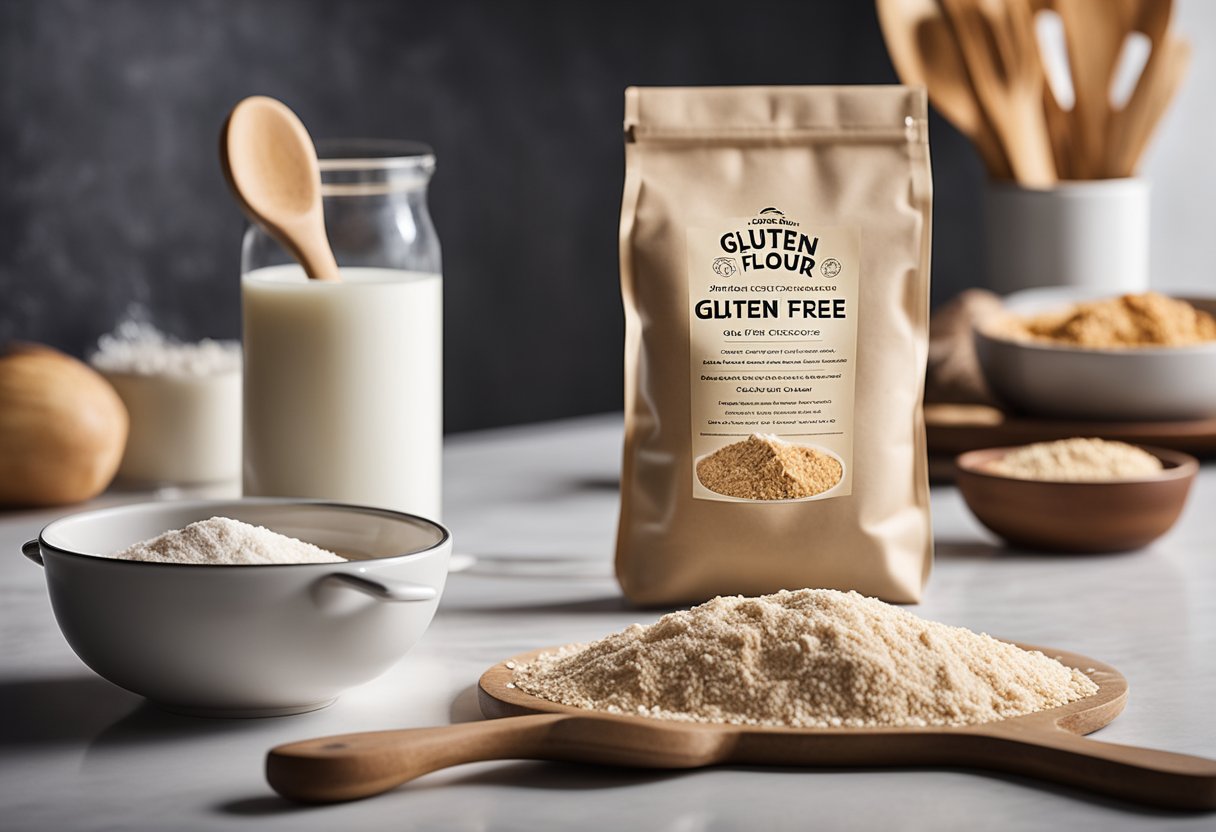
As someone who has dietary restrictions, finding the right oat flour substitute can be a challenge. For those who are gluten-free, certified gluten-free oats can be used as a substitute for oat flour.
Gluten-free flour blends, such as almond flour, coconut flour, or rice flour, can also be used as a substitute for oat flour in gluten-free baking.
Individuals with celiac disease or gluten sensitivity should be cautious when using oat flour substitutes. While oats themselves are gluten-free, they are often processed in facilities that also process wheat, barley, and rye, which can lead to cross-contamination.
Therefore, it is important to use certified gluten-free oats or gluten-free flour blends to avoid any potential reactions.
For those following a low-carb or keto-friendly diet, almond flour, coconut flour, or flaxseed meal can be used as a substitute for oat flour.
These alternatives are low in carbohydrates and high in healthy fats, making them a great option for those on a low-carb or keto-friendly diet.
When substituting oat flour, it is important to keep in mind the texture and consistency of the substitute.
Some substitutes, such as coconut flour, are more absorbent than oat flour and require more liquid in the recipe. Others, such as almond flour, have a different texture and may not work well in certain recipes.
In summary, when looking for an oat flour substitute, it is important to consider your dietary restrictions and choose a substitute that fits your needs.
Gluten-free flour blends, certified gluten-free oats, and low-carb alternatives such as almond flour or coconut flour are all great options to consider. Just be sure to keep in mind the texture and consistency of the substitute when using it in your recipe.
Purchasing Substitutes
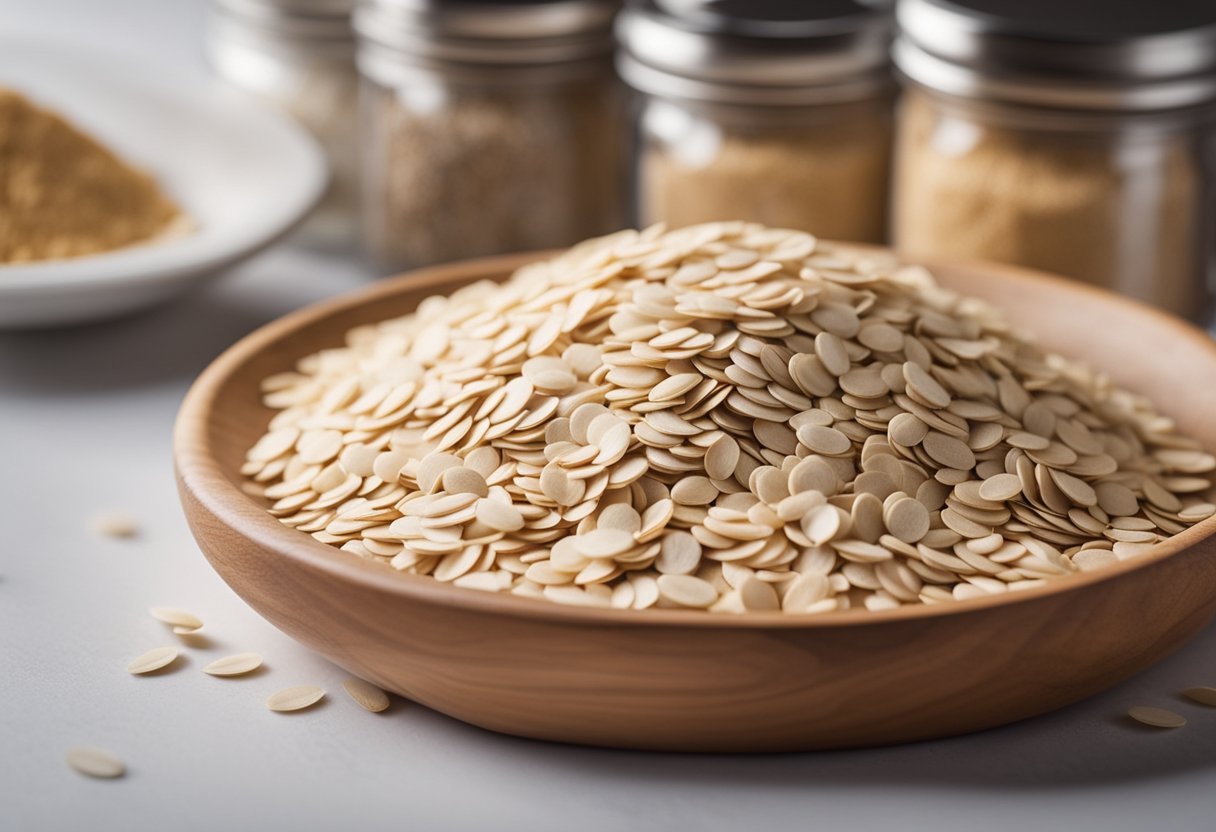
When it comes to purchasing substitutes for oat flour, there are a few options available. One popular brand that offers oat flour substitutes is Bob’s Red Mill.
They offer a variety of gluten-free flour blends that can be used as a substitute for oat flour, including their Gluten-Free 1-to-1 Baking Flour and their Gluten-Free All-Purpose Baking Flour.
These blends are made with a combination of rice flour, potato starch, and other gluten-free flours, and can be found in most health food stores.
Another option for purchasing oat flour substitutes is to look for flour blends that are specifically designed for gluten-free baking.
These blends often include a combination of gluten-free flours, such as rice flour, potato starch, and tapioca flour, and can be found in most health food stores. Some popular brands that offer gluten-free flour blends include King Arthur Flour, Cup4Cup, and Pamela’s Products.
If you are unable to find a suitable substitute for oat flour at your local health food store, you may want to consider purchasing the ingredients separately and making your own flour blend.
This can be done by combining a variety of gluten-free flours, such as rice flour, potato starch, and tapioca flour, in the correct proportions. There are many recipes available online that can guide you through the process of making your own gluten-free flour blend.
Overall, there are many options available when it comes to purchasing substitutes for oat flour.
Whether you choose to purchase a pre-made flour blend or make your own, it is important to ensure that the ingredients are gluten-free and suitable for your dietary needs.
Conclusion
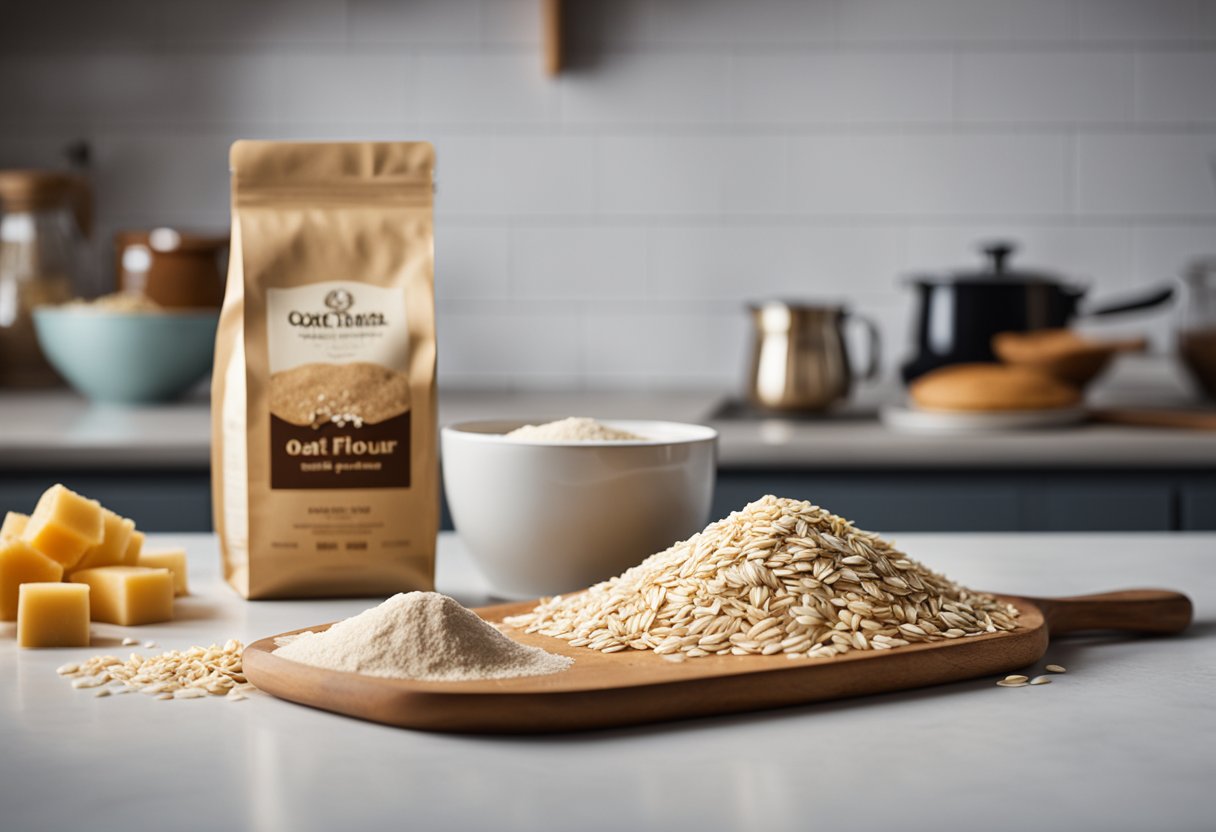
In conclusion, finding a substitute for oat flour is easy and can be done using many different types of flour. Those who are looking for a gluten-free option can use sorghum flour, buckwheat flour, millet flour, or gluten-free 1:1 baking flour as a substitute for oat flour.
These flours are all gluten-free and have similar textures to oat flour, making them great alternatives.
For those who do not need a gluten-free option, regular flour or white flour can be used as a substitute for oat flour. However, it is important to note that these flours are not gluten-free and may not be suitable for those with gluten sensitivities or celiac disease.
When substituting oat flour with other flours, it is important to keep in mind that the texture and taste may vary slightly.
For example, brown rice flour has a similar taste and texture to oat flour, making it a great substitute. Rice flour, on the other hand, has a similar texture to oat flour but may not have the same nutty taste.
Overall, finding a substitute for oat flour is easy and can be done using many different types of flour. Whether you are looking for a gluten-free option or a regular flour substitute, there are many options available.
Frequently Asked Questions
Can oat flour be substituted for all-purpose flour in cookies?
Yes, oat flour can be substituted for all-purpose flour in cookies. However, keep in mind that oat flour does not contain gluten, which is essential for the structure of baked goods.
Therefore, cookies made with oat flour may have a different texture than those made with all-purpose flour.
How can coconut flour be substituted for oat flour?
Coconut flour is very absorbent, so it cannot be substituted for oat flour on a one-to-one basis. To substitute coconut flour for oat flour, use only 1/4 to 1/3 cup of coconut flour for every 1 cup of oat flour. You may also need to increase the amount of liquid in the recipe.
What is the oat flour to coconut flour ratio?
The oat flour to coconut flour ratio is typically 3:1 or 4:1. This means that for every 3 or 4 parts oat flour, you would use 1 part coconut flour.
Is oat flour gluten-free?
Oat flour is naturally gluten-free. However, it is important to note that many oats are processed in facilities that also process wheat, barley, and rye, which are all sources of gluten.
If you have celiac disease or a gluten intolerance, be sure to look for certified gluten-free oat flour.
What is a good replacement for oat flour?
There are several good replacements for oat flour, including almond flour, coconut flour, buckwheat flour, and brown rice flour.
Each of these flours has a slightly different flavor and texture, so it is important to choose the one that will work best for your recipe.
Are almond flour and oat flour interchangeable?
Almond flour and oat flour are not interchangeable on a one-to-one basis. Almond flour is much higher in fat and lower in carbohydrates than oat flour, which means it will behave differently in recipes.
However, you can use a combination of almond flour and oat flour to create a gluten-free flour blend that works well in many recipes.


